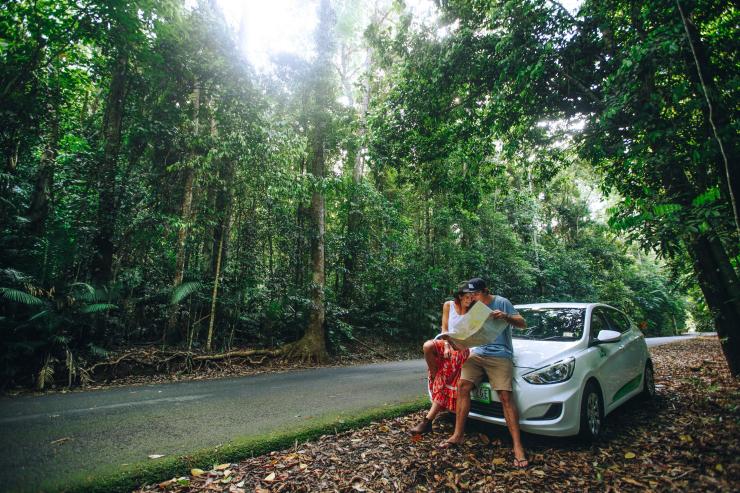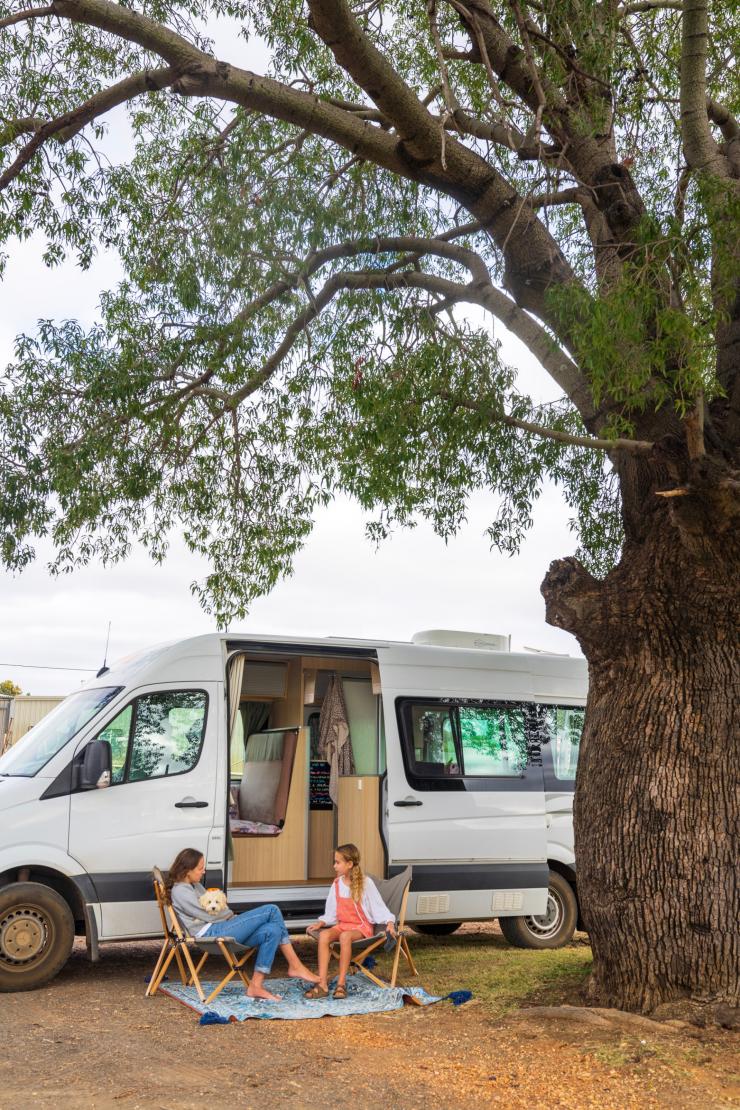
How to hire a car, campervan or 4WD in Australia
Want to choose your own Australian adventure? Hiring a car or campervan is the perfect way to experience your journey.
By Lee Atkinson
Nothing beats the freedom of having your own set of wheels, especially here in Australia, where road tripping is a way of life and there are campgrounds and caravan parks in almost every town.
Hiring a vehicle means you can forget about juggling timetables and really get to know Australia. You’ll be able to explore the countryside and towns off the tourist trail and have really easy access to some of our amazing natural attractions. Hire a campervan you can cook and sleep in and you’ll cut down on accommodation costs, too. What’s not to love about that?
What’s best, a campervan, motorhome or 4WD?

Big River Ranch, Kalbarri, Western Australia © Tourism Western Australia
What’s the difference between a campervan (sometimes called RVs overseas) and a motorhome? Basically, it comes down to size. Motorhomes are built on a truck chassis, campervans on a van. Both have beds, sinks, stoves, a fridge, storage space and power outlets for charging devices, but you’ll get lots more space inside a motorhome, and there’s often a toilet and sometimes even a shower. Because they’re bigger, motorhomes can be trickier to drive and park than a more compact campervan, and they do use a bit more fuel.
You don’t need a 4WD to see Australia, but it can be handy if you’re keen to head into the outback or spend lots of time in national parks. There are some locations and attractions off sealed roadways where access is permitted only with a 4WD vehicle, such as the Bungle Bungle Ranges. 4WD car hire companies offer manual and automatic options, including 4WD campers.
Generally you must be over 21 to hire a campervan or motorhome in Australia (although for some companies the minimum age is 18), but you don’t need a special permit to drive one. If you don’t have an Australian driver’s licence you might need an International Driving Permit (IDP).
Where and how to hire a car or campervan

Noosa, Queensland © Jucy
There are car hire booths at all major airports and often at major hotels. You’ll find branches in big cities and regional towns, but it’s a good idea to book ahead, especially for campervans and motorhomes. Pre-book online before you arrive and you can pick up your vehicle at the airport.
Comparison sites like Campervan Rental Guide, VroomVroomVroom and DriveNow can help you find a good deal. You’ll need to pay a refundable security bond, so remember to factor that into your budget. Most companies will insist that this is paid with a credit card.
Tips when hiring a car or campervan

Great Ocean Road, Victoria © Jucy, Katie Purling
When you hire a campervan or motorhome, most will include cooking gear and eating utensils, but often you’ll need to pay extra for bed linen and camping gear such as outdoor chairs, GPS, child seats and so on, so always check when you’re hiring. If you prefer automatic transmission, make sure you ask for this too when making your booking.
One-way hire, and dropping off in a different city or state to the one you started in, often costs more than if you start and finish in the same place. The longer you hire for, the cheaper it will be.
If it’s your first time driving in Australia, or on the left-hand side of the road, be sure to brush up on Australian driving rules and basics before you arrive.
Whether you’re hiring a car, a campervan or a motorhome, it pays to read the fine print. Things to look out for in contracts include limits to how many kilometres you can drive, cleaning fees, rules about travelling on unsealed roads (many hire companies will not allow you drive on dirt roads) and insurance details. And always make sure you inspect your vehicle carefully when you pick it up, making note of any pre-existing damage on your paperwork: it’s a good idea to take a few photos with your smartphone.
4WD travel around Australia

K'gari, Queensland © Tourism & Events Queensland
Heading off the beaten path or out on one of Australia's great road trips doesn't usually require a 4WD vehicle, however there are some places where an off-road adventure will call to you. From the red dirt roads of the outback to our white sandy beaches, travelling by 4WD in Australia provides exclusive access to locations otherwise inaccessible. And if you want to feel like a true Aussie, one of the best 4WDs to travel around Australia is the Safari Landcruiser. It's important to note that hire companies may charge added fees for anyone under 25 years of age.
Many hire companies will provide a quick overview of your vehicle, but before driving in any remote areas be sure to consider the following:
- Access is permitted and/or appropriate passes have been secured
- You have the appropriate PSI on your tires
- You have at least one spare tire and a tool kit
- You have the right clearance level on your vehicle
- You've checked for road conditions and closures
- You've let someone know where you'll be travelling as some areas may not have cell phone coverage
Where can you park your campervan or motorhome?

BIG4 Koala Shores Port Stephens Holiday Park, Port Stephens, New South Wales © Destination NSW
The battery that powers your van’s fridge and lights will recharge while you’re driving, but you’ll need to plug into a powered site every two days or so if you’re camping in the same spot for a while. Most commercial caravan parks have powered sites – as well as communal bathrooms, coin-operated laundries and cooking areas – and you’ll find one in almost every town.
Most national park campgrounds don’t have power or hot showers, but they do have composting toilets and are always in beautiful spots. Many towns offer free overnight parking for self-contained RVs, which means you’ll need to have an onboard toilet to stay there.
Read next
How to plan an Australian outback road trip
Where to hire a car, campervan, motorhome or 4WD

Stuart Highway, Northern Territory © Tourism NT, Steve Strike
For car rentals, the largest companies include Avis, Budget, Europcar, Hertz, SIXT, and Thrifty. For campervans and motorhomes, try: Apollo, Britz, Campervan Village, JUCY, Let’s Go Motorhomes, Maui, Spaceships, Travellers Autobarn, and Wicked Campers. You can also rent privately owed campervans and motorhomes through Camplify.



































































































































